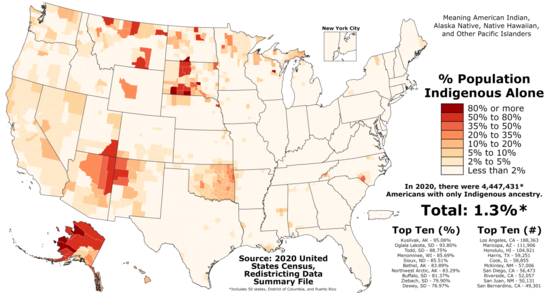| Part of a series on |
| Native Americans in the United States |
|---|

Native American civil rights are the civil rights of Native Americans in the United States. Native Americans are citizens of their respective Native nations as well as of the United States, and those nations are characterized under United States law as "domestic dependent nations", a special relationship that creates a tension between rights retained via tribal sovereignty and rights that individual Natives have as U.S. citizens. This status creates tension today but was far more extreme before Native people were uniformly granted U.S. citizenship in 1924. Assorted laws and policies of the United States government, some tracing to the pre-Revolutionary colonial period, denied basic human rights—particularly in the areas of cultural expression and travel—to indigenous people.[1]
Although the many tribes and peoples indigenous to the United States have varying civil rights priorities, there are some rights that nearly all Native Americans are actively pursuing. These include the protection of voting rights and resistance to the cultural assimilation of Native Americans. Many tribes that live on Indian reservations are currently facing the destruction of surrounding environments and water sources, depressed economies, sexual violence against women, and substance abuse.[2]
- ^ "American Indian Civics Project: 1871 to 1924- Allotment and Assimilation". americanindiantah.com. Archived from the original on July 16, 2011.
- ^ NoiseCat, Julian Brave (July 30, 2015). "13 Issues Facing Native People Beyond Mascots And Casinos". Huffington Post. Retrieved October 31, 2018.
© MMXXIII Rich X Search. We shall prevail. All rights reserved. Rich X Search
